新概念1册_nce1-lesson51-52
- 格式:ppt
- 大小:9.57 MB
- 文档页数:82
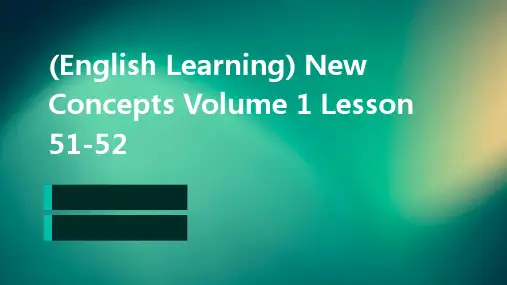
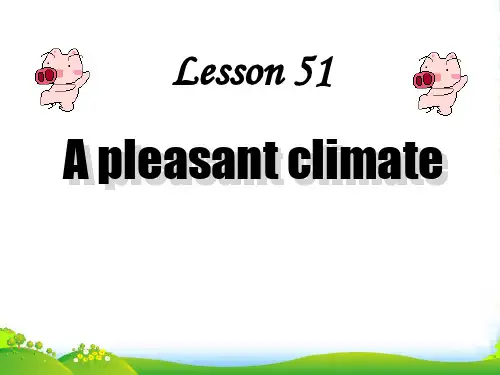
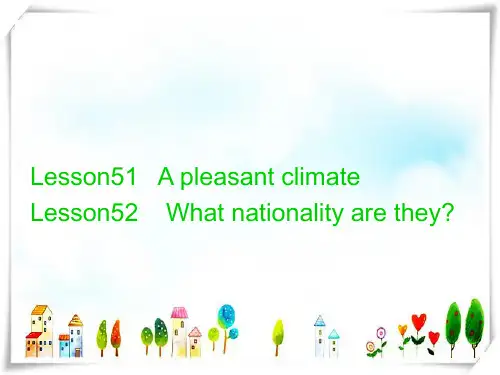

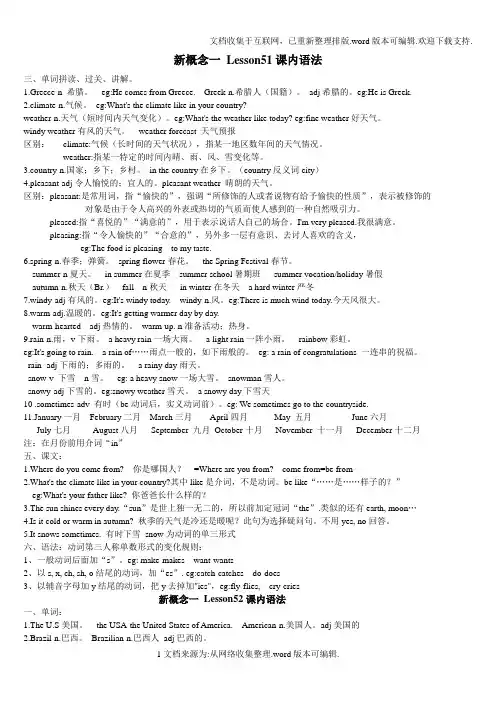
新概念一Lesson51课内语法三、单词拼读、过关、讲解。
1.Greece-n 希腊。
eg:He comes from Greece. Greek-n.希腊人(国籍)。
adj希腊的。
eg:He is Greek.2.climate-n.气候。
eg:What's the climate like in your country?weather-n.天气(短时间内天气变化)。
eg:What's the weather like today? eg:fine weather好天气。
windy weather有风的天气。
weather forecast 天气预报区别:climate:气候(长时间的天气状况),指某一地区数年间的天气情况。
weather:指某一特定的时间内晴、雨、风、雪变化等。
3.country-n.国家;乡下;乡村。
in the country在乡下。
(country反义词city)4.pleasant-adj令人愉悦的;宜人的。
pleasant weather 晴朗的天气。
区别:pleasant:是常用词,指“愉快的”,强调“所修饰的人或者说物有给予愉快的性质”,表示被修饰的对象是由于令人高兴的外表或热切的气质而使人感到的一种自然吸引力。
pleased:指“喜悦的”“满意的”,用于表示说话人自己的场合。
I'm very pleased.我很满意。
pleasing:指“令人愉快的”“合意的”,另外多一层有意识、去讨人喜欢的含义,eg:The food is pleasing to my taste.6.spring-n.春季;弹簧。
spring flower春花。
the Spring Festival春节。
summer-n夏天。
in summer在夏季summer school暑期班summer vocation/holiday暑假autumn-n.秋天(Br.)fall n秋天in winter在冬天 a hard winter严冬7.windy-adj有风的。
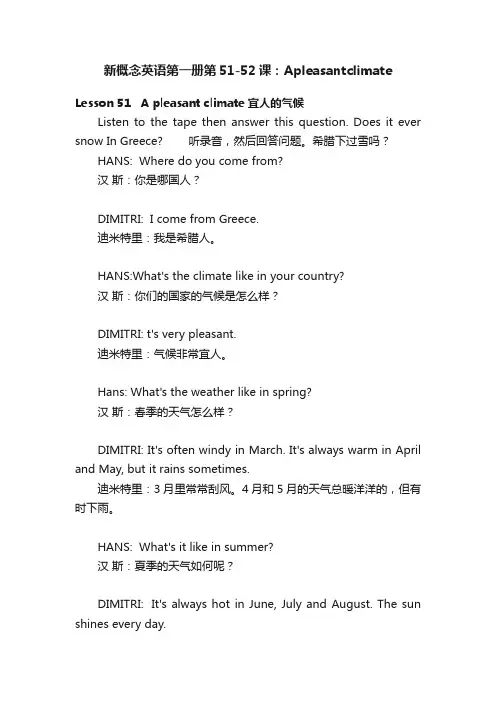
新概念英语第一册第51-52课:ApleasantclimateLesson 51 A pleasant climate宜人的气候Listen to the tape then answer this question. Does it ever snow In Greece? 听录音,然后回答问题。
希腊下过雪吗?HANS: Where do you come from?汉斯:你是哪国人?DIMITRI: I come from Greece.迪米特里:我是希腊人。
HANS:What's the climate like in your country?汉斯:你们的国家的气候是怎么样?DIMITRI: t's very pleasant.迪米特里:气候非常宜人。
Hans: What's the weather like in spring?汉斯:春季的天气怎么样?DIMITRI: It's often windy in March. It's always warm in April and May, but it rains sometimes.迪米特里:3月里常常刮风。
4月和5月的天气总暖洋洋的,但有时下雨。
HANS: What's it like in summer?汉斯:夏季的天气如何呢?DIMITRI: It's always hot in June, July and August. The sun shines every day.迪米特里:6月、7月和8月的天气总是炎热的。
每天都出太阳。
HANS: Is it cold or warm in autumn?汉斯:秋季的天气是冷还是暖呢?DIMITRI: It's always warm in September and October. It's often cold in November and it rains sometimes.迪米特里:9月和10月总是很暖和,11月常常就冷了,而且有时下雨。
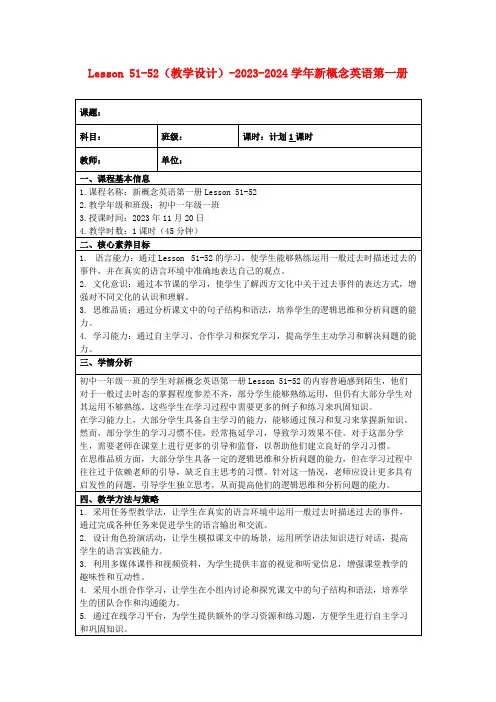

“代替”的相关英语短语“代替”一词的英文单词是replace,或者是substitute.“代替”的相关英文短语有take the place of和instead of.Instead (副词)代替(一般放句尾) Instead of (介词短语)代替(后加名词/动名词doing/what引导的宾语从句) .in place of带来;引进;提出;挣得(报酬等);生产,产生;收获;(陪审团)下(判决):bring in 代替;而不是;更换;顶替:in place of 代替;而不是:instead of ...下面我们来看一些相关例句:1.这道食谱可以用牛奶代替奶油。
You can use milk in place of cream in this recipe.《牛津词典》2.做这道菜可以用人造黄油代替黄油。
Margarine can be substituted for butter in this recipe.《牛津词典》3.做熟的四季豆可以用来代替菜豆。
Cooked kidney beans can be used in place of French beans.《柯林斯英汉双解大词典》4.他们找到了代替她的人没有?Have they found anyone to replace her yet?《牛津词典》5.她把柴油代替汽油灌入油箱,造成发动机失灵。
She put diesel fuel, instead of petrol, into the tank causing the motor to seize up.《柯林斯英汉双解大词典》6.索菲在父亲去世后没有刻意地找一个代替的人。
Sophie was not consciously seeking a replacement after her father died.《柯林斯英汉双解大词典》7.如果你找不到自发面粉,可以用普通面粉来代替。
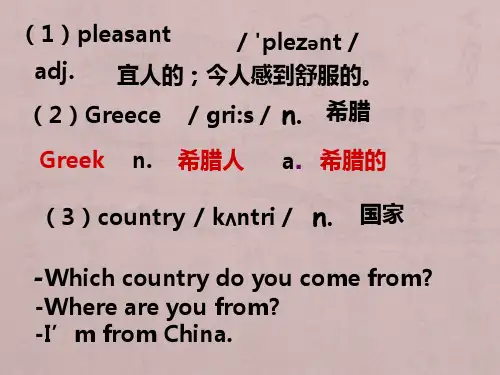
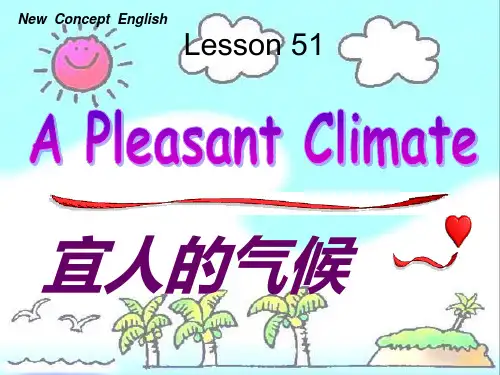
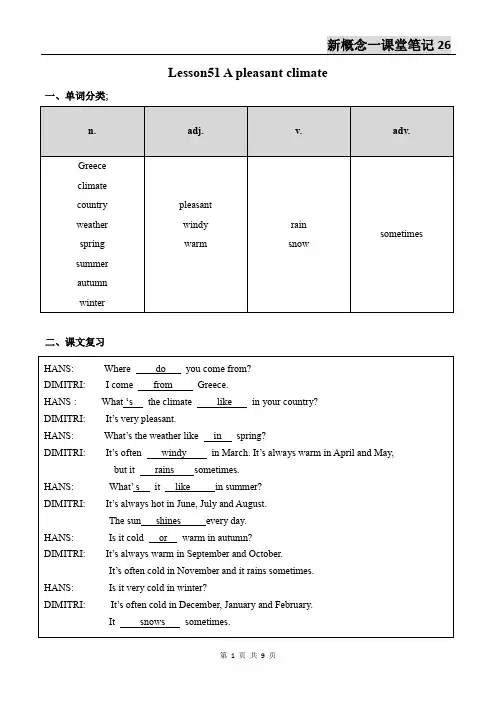
Lesson51 A pleasant climate 一、单词分类;二、课文复习三、课文重点四、词组五、语法解析1.weather天气1.It's also rainy (rain) in Hangzhou.2.Look at the snow (snow). It is snowing (snow) heavily.3.What’s the weather like in spring?It’s warm and sunny (sun).4.What a heavy fog (fog)!5.It winds (wind) a lot in autumn.6.Don’t go outside. It’s raining (rain) now.7.It’s dirty in Zhengzhou in winter, because it’s always hazy (haze).8.There are lots of clouds (cloud) in the sky. It’s going to rain (rain).2.like&be likelike v. 喜欢,助动词常用do/doeslike prep. 像,像...一样,助动词常用beWhat’s ... like? = How翻译:1.I like cats. 我喜欢猫。
2.He looks like his mother. 他看起来像他的妈妈。
3.Do it like this. 请这样做。
4.Do they like their new house? 他们喜欢他们的新房子吗?5.What’s your father like? 你的父亲是什么样的人?6.What does your father like? 你的父亲喜欢什么?回答下列问题1.What does your mother like doing? She likes cooking.2.What is your mother like? She is kind and beautiful.3.What kind of weather do you like best? I like sunny days.4.What’s the weather like today? It’s sunny.5.What’s the climate like in China? It’s pleasant.6.What’s your teacher like? She is nice.e from&be from 意思为来自... ,后跟国家1.What nationality are you? I’m French (France).2.Where are you from? I’m from China. (China)3.Where do you come from? I come from Holland. (Holland)4.Where is the girl from?5.Mike and Sue come (come) from the UK.6.Where does your friend come from? He comes from Japan.7.I come from Sweden. (同义句转换)I am from Sweden.8.Mary is from the U.S. (同义句转换)Mary come from the U.S.9.We are Chinese. (对划线部分提问)What nationality are you?10.He comes from Norway. (变一般疑问句)Does he come from Norway?4.频度副词:表示频度的副词,是一般现在时时的标志词一直,总是always ,通常usually ,经常often ,有时sometimes ,很少rarely ,从不never频度副词放在行为动词前,助动词/ be动词/ 情态动词后练习:(在正确的位置加入频度副词)1.Tom is hungry. (always) Tom is always hungry.2.What do you do on Sundays? (often) What do you often do on Sundays?3.Your mother can’t help you. (always) Your mother can’t always help you.4.Jerry goes to the park to take a walk. (sometimes)Jerry sometime s goes to the park to take a walk.5.Does he finish his homework? (usually) Does he usually finish his homework?6.I hate potatoes, so I eat them. (never) I hate potatoes, so I never eat them.5.一般现在时定义:fact ( 事实),指客观事实或客观真理1.I don’t like rabbits. ( not like)2.He wants some juice. (want)3.Do they have any friends? (have)4.I come from China. (come)5.The sun rises from the east. (rise)●结构肯定句:(非单三)主语+ 动词原形+宾语否定句:(非单三)主语+ don’t +动词原形+宾语.一般疑问句:Do +(非单三)主语+动词原形+宾语+?特殊疑问句:特词+ do +(非单三)主语+动词原形+宾语+?肯定句:(单三)主语+ 动词单三+宾语否定句:(单三)主语+ doesn’t +动词原形+宾语.一般疑问句:Does +(单三)主语+动词原形+宾语+?特殊疑问句:特词+ does +(单三)主语+动词原形+宾语+?肯定句:I come from England.否定句:I don’t come from England.一般疑问句:Do you come from England? 答句:Yes, I do. / No, I don’t.特殊疑问句:Where do you come from? 肯定句:He wants to play in the yard.否定句:He doesn’t want to play in the yard. 一般疑问句:Does he want to play in the yard? 答句:Yes, he does. / No, he doesn’t.特殊疑问句:What does he want to do in the yard?●动词原形变单三规则:1.直接加s2.以o, s, x, ch, sh 结尾,加es3.以辅音加y 结尾,变y 为i 加es4.特殊have ---has练习run---runs play---plays fix---fixes fly---flies swim---swims jump---jumpscatch---catchescry---crieshave---hasguess---guessesdo---doesgo---goesbuy---buyslook---lookswatch---watchesfind---findsbrush---brusheswash---washes六、单词填空1.There are 4 seasons in a year, they are s pring , s ummer ,a utumn and w inter .2.It’s not dry. It is w et .3.It rains a lot, it is a r ainy day.4.The wind is blowing, it is a w indy day.七、语法练习1.模仿例句完成以下句子I come from England, but Stella comes from Spain.1. We come from Germany, but Dimitri comes from Greece.2. I like cold weather, but he likes warm weather.3. He comes from the U.S. , but she comes from England.4. She doesn't like the winter, but she likes the summer.5. I come from Norway, but you come from Spain.6. Stella comes from Spain, but Hans and Karl come from Germany.7. We don't come from Spain. We come from Brazil.2.模仿例句,提问并回答he/ (Brazil) / the U.S.Where does he come from?Does he come from Brazil?No, he doesn't come from Brazil. He comes from the U.S.What nationality is he?He's American.she / (England) / the U.S.Where does she come from?Does she come from England?No, she doesn’t come from England. She comes from the U.S.What nationality is she?She’s American.3.选择填空( C ) 1. What the climate in winter here?A. does, likeB. is, likesC. is likeD. do, like ( C ) 2. The weather is cold the East.A. atB. onC. inD. by( D ) 3. Where do you come ?A. inB. onC. nearD. from( A ) 4. It’s often windy March.A. inB. onC. byD. near( A ) 5. It’s always warm spring.A. inB. onC. byD. near( D ) 6. This is Ben. He is . He speaks .A. England, EnglishB. English, EnglandC. England, EnglandD. English, English( D ) 7. David comes from Norway. He is .A. ItalianB. AmericanC. ChineseD. Norwegian ( C ) 8. What are they?A. nationB. nationalC. nationalityD. international ( C ) 9. ---How does your sister spend the weekend?---Oh, she usually TV, and she now.A. watch, watchingB. watches, watchingC. watching, is watchingD. watches, is watching( C ) 10. David any classes on Sundays.A. don’t haveB. hasC. doesn’t haveD. haven’t4.用所给的词语的适当形式填空1. Hans and Tom come (come) from Spain.2. I come from France, but Linda comes (come) from Norway.3. We like (like) English very much.4. Does he want (want) any meat?5. He is sitting (sit) on the grass.6. I can move (move) the piano.7. It doesn’t rain (rain) in Winter.8. Liu Tao does (do) not like PE.9. It is often windy (wind) in April.10. Do your parents read (read) newspapers every day?八、扩展阅读1.宾馆hotel2.在第50层on the fiftieth floor3.看电影go to a cinema4.回来晚了come back late5.助手,助理assistant6.今晚tonight7.大厅hall8.其中之一one of + 名词复数9.转向某人turn to sb.10.做...不容易It is not easy to do sth.11.在去某地的路上on one’s way to sp.12.讲笑话tell jokes13.讲故事tell stories14.同意agree15.休息have a rest16....的钥匙the key to九、课后练习一.根据句意及首字母用词的适当形式填空。